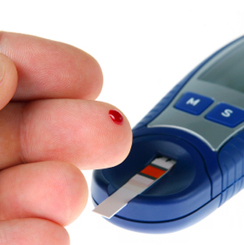Back to General Health
Probiotics may reduce fasting blood glucose in type 2 diabetes

July 12, 2016
In adults with type 2 diabetes, the use of certain probiotics was shown to decrease fasting blood glucose, whereas the effects on HbA1c remain unclear, according to study findings.
In a systematic review, Syamimi Samah, of the department of pharmacy at Universiti Teknologi in Malaysia, and colleagues analyzed six randomized controlled trials investigating the use of probiotics in any form as an intervention in adult patients with type 2 diabetes; five studies were included in the meta-analysis. Two of the trials used probiotics in yogurt form; one used kefir; three used probiotics in capsule form. All but one Denmark-based study was conducted in Iran; all were conducted within the past 5 years; four studies used blends of various probiotic genera, including lactobacilli and bifidobacteria. Two trials were industry sponsored.
In pooled estimates, there was no difference in HbA1c between the probiotic and control groups across studies, despite four studies documenting a decrease in HbA1c (P < .05).
However, researchers found probiotic use was associated with a mean 0.98 mmol/L decrease in fasting blood glucose (95% CI, –1.17 to –0.78); removing one study with a small sample size (n < 20 for each group) and use of random-effect model did not change the significance of pooled estimates for fasting blood glucose. Using single or multiple probiotic genus did not affect the difference in fasting blood glucose reduction; subgroups using less than 10 colony-forming units (CFU) and at least 10 CFU also saw similar reductions in fasting blood glucose.
Researchers found no association between pooled estimates of probiotics on fasting plasma insulin and probiotic dosage and mixed responses in the four studies that reported on the anti-inflammatory effects of probiotics.
The researchers noted that all studies ranged in duration from 4 to 8 weeks, and only one study determined sample size based on the reduction in HbA1c between the intervention and placebo groups; three did not report on the power calculation when determining their sample sizes.
“The current meta-analysis suggested moderate beneficial hypoglycemic effects of certain probiotics, with significantly lower [fasting blood glucose],” the researchers wrote. “Findings on HbA1c, anti-inflammatory and anti-oxidative effects of probiotics in the clinical setting, however, remain inconsistent, and thus, merit further investigations in future clinical studies.” – by Regina Schaffer
Disclosure: The researchers report no relevant financial disclosures.
http://www.healio.com/endocrinology/diabetes/news/online/%7B1628e81a-3839-492c-8cc3-810fb622186e%7D/probiotics-may-reduce-fasting-blood-glucose-in-type-2-diabetes
In adults with type 2 diabetes, the use of certain probiotics was shown to decrease fasting blood glucose, whereas the effects on HbA1c remain unclear, according to study findings.
In a systematic review, Syamimi Samah, of the department of pharmacy at Universiti Teknologi in Malaysia, and colleagues analyzed six randomized controlled trials investigating the use of probiotics in any form as an intervention in adult patients with type 2 diabetes; five studies were included in the meta-analysis. Two of the trials used probiotics in yogurt form; one used kefir; three used probiotics in capsule form. All but one Denmark-based study was conducted in Iran; all were conducted within the past 5 years; four studies used blends of various probiotic genera, including lactobacilli and bifidobacteria. Two trials were industry sponsored.
In pooled estimates, there was no difference in HbA1c between the probiotic and control groups across studies, despite four studies documenting a decrease in HbA1c (P < .05).
However, researchers found probiotic use was associated with a mean 0.98 mmol/L decrease in fasting blood glucose (95% CI, –1.17 to –0.78); removing one study with a small sample size (n < 20 for each group) and use of random-effect model did not change the significance of pooled estimates for fasting blood glucose. Using single or multiple probiotic genus did not affect the difference in fasting blood glucose reduction; subgroups using less than 10 colony-forming units (CFU) and at least 10 CFU also saw similar reductions in fasting blood glucose.
Researchers found no association between pooled estimates of probiotics on fasting plasma insulin and probiotic dosage and mixed responses in the four studies that reported on the anti-inflammatory effects of probiotics.
The researchers noted that all studies ranged in duration from 4 to 8 weeks, and only one study determined sample size based on the reduction in HbA1c between the intervention and placebo groups; three did not report on the power calculation when determining their sample sizes.
“The current meta-analysis suggested moderate beneficial hypoglycemic effects of certain probiotics, with significantly lower [fasting blood glucose],” the researchers wrote. “Findings on HbA1c, anti-inflammatory and anti-oxidative effects of probiotics in the clinical setting, however, remain inconsistent, and thus, merit further investigations in future clinical studies.” – by Regina Schaffer
Disclosure: The researchers report no relevant financial disclosures.
http://www.healio.com/endocrinology/diabetes/news/online/%7B1628e81a-3839-492c-8cc3-810fb622186e%7D/probiotics-may-reduce-fasting-blood-glucose-in-type-2-diabetes

